Over the years, authorities in the Dominican Republic have adopted a set of practices, standards and judicial decisions directed to denationalize people born in this country who descend from Haitian migrants.
This process of denationalization began with the practice of registry officials in refusing to register the birth of children of Haitian migrants born in the Dominican Republic. Since then, it has gradually expanded through the adoption of various measures, laws, and judicial decisions of other branches of the Dominican State.
With no other nationality, this process has meant that tens of thousands of people have become stateless in Dominican Republic.
IACHR Publishes Report:
"Situation of Human Rights in Dominican Republic"
This report in presented to examine the situation created by judgment 168/13 of the Dominican Republic’s Constitutional Court on September 23, 2013 with regard to the rights to nationality, legal personality, equality and non-discrimination, as well as other related human rights.
Furthermore, the report will also make recommendations to ensure that the policies, laws and practices of the Dominican Republic are in compliance with the international obligations that the State voluntarily undertook in the area of human rights.
Photo credit: Amy S. Martin
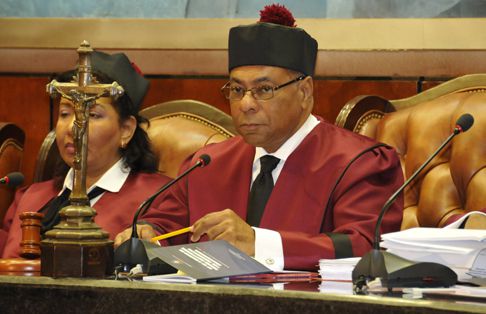
Photo credit: Constitutional Court of the Dominican Republic
Deprivation of Nationality and Statelessness by the Constitutional Court’s judgment 168/13
In 2013, the Constitutional Court’s judgment 168/13 established that only persons born in the Dominican Republic to Dominican parents or legal residents are consider citizens.
This interpretation was applied retroactively to all persons born between 1929 and 2010: arbitrarily depriving hundreds of thousands of people of Haitian descent, of their Dominican nationality, and created a situation of statelessness of a magnitude never before seen in the Americas.
The criterion established in judgment 168/13, as well as the measures adopted to implement that judgment, come to constitute a crucial stage in this type of historical revisionism promoted by the Dominican authorities, aimed at consolidating an interpretation that establishes that persons born in the Dominican Republic of Haitian parents with an irregular migratory status do not have the right to Dominican nationality.
Photo credit: Daniel Cima para la CIDH
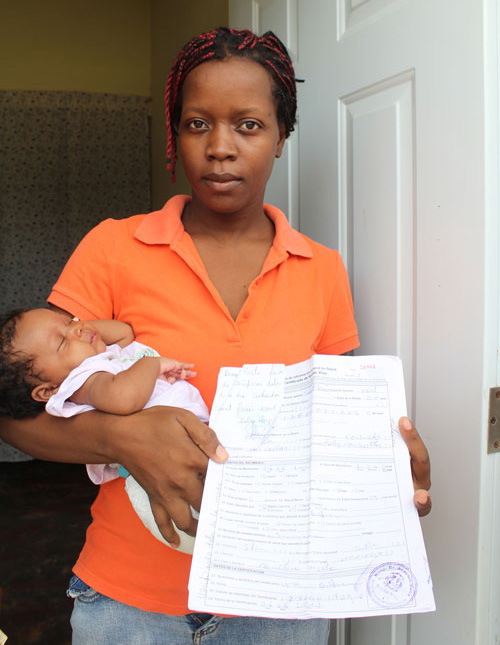
Photo credit: Álvaro Botero/CIDH
The judgment 168/13 as an Arbitrary Deprivation of Nationality
Arbitrariness
They are arbitrarily deprived of citizenship because they are migrants, they are people who were born in the Dominican Republic when applied the concept of jus soli –i.e. when someone born in that country was granted citizenship. So much so, that the relevant authorities were given documents. But after the sentence, they took them away.
Structural Discrimination
The reasons underlying the decision taken by the Constitutional Court pertain to a context of structural discrimination based mainly on racial and ethnic criteria, which have disproportionately affected persons of Haitian descent.
Disproportion
This situation has disproportionately affected people of Haitian descent, who frequently are identified as such, correct or incorrectly, based on the national origin or migratory status of their parents, skin color, language ability or surnames, constituting a violation of the right to equality and non-discrimination.
Authority of the States to determine who has a right to be a national is limited by their obligation to prevent, avoid and reduce statelessness.
I/A Court H.R. Case of the Yean and Bosico Girls v. Dominican Republic. Judgment of September 8, 2005.
Timeline
Racial Discrimination and the Process of Denationalization Against People of Haitian Descent
-
1971-1804
Haiti: Independence and Abolition of Slavery
The revolution that took place between 1791 and 1804 brought about the abolition of slavery and the independence of Haiti, this revolutionary process was the first and only one by black slaves. -
1822-1844
Haiti Invades Dominican Republic
For the ensuing 22 years, Haiti governed the eastern part of the island. As the occupation continued and the expectations of the population were not being met, a separatist movement was established and materialized in 1844. Haiti’s occupation of the Dominican Republic still has a major impact on the Dominican collective imagination. -
1900'
The So-Called "Peaceful Invasion"
In the early 1900s, the sugar industry became a permanent source of employment for Haitian migrant workers, a trend that continued until the 1980s. -
The United States government organized and fostered the temporary migration of Haitian farm workers into the Dominican Republic. It did this by establishing a regulated contracting system in 1919 for recruiting Haitian farm workers.
-
1929-1963
Constitutions of 1929, 1943, 1942, 1947, 1955, 1959, 1960, 1960', 1961, 1962 y 1963
Article 8.— Dominicans are:
1.— People who at present enjoy this quality under previous constitutions and laws.
2.— All persons born in the territory of the Republic with the exception of the legitimate children of foreigners resident in the country in diplomatic representation or in transit. -
Starting in 1930, during the Trujillo dictatorship, the State interested in emphasizing the racial differences with Haiti. Between September 28 and October 8, 1937, the dictator Rafael Leónidas Trujillo ordered a massacre in which thousands of Haitians died. The scene of the massacre was mainly the border provinces, such that the event is known as the “Dominicanization of the border.”
-
1952, 1959 y 1966
Mass Recruitment of Haitian Farm Workers
These agreements were signed in 1952, 1959 and 1966 and again triggered an increase in the Haitian population in the bateyes. Under these agreements, a worker was encouraged to immigrate with his wife and any of his children who were under the age of 10. -
1966-2002
Constitutions of 1966, 1994 y 2002
Article 11.— Dominicans are:
1.— All persons born in the territory of the Republic with the exception of the legitimate children of foreigners resident in the country in diplomatic representation or in transit.
2.— People who are currently invested with this quality under previous constitutions and laws. -
November 14, 1967
Letter from the Director General of Immigration
Letter from John R. Estrella, Director General of Immigration to the Secretary of State for the Armed Forces.
Fondo Presidencia Palacio Nacional. Sujeto: Repatriaciones. Caja 14,441 1966-1986. Archivo General de la Nación, Santo Domingo. -
May 6, 1969
Letter from the Secretary of State
Letter from Manuel de Jesús Estrada Medina Secretary of State, Head of the Directorate General of Immigration to Doctor Joaquin Balaguer.
Fondo Presidencia Palacio Nacional. Sujeto: Braceros Haitianos. Caja 14,455 1967-1989. Archivo General de la Nación, Santo Domingo. -
February 17, 1976
Letter from Chief of Staff
Letter from Braulio Álvarez Sánchez, Brigadier General EN, Chief of Staff, National Army to the Secretary of State for the Armed Forces.
Fondo Presidencia Palacio Nacional. Sujeto: Bracero Haitianos. Caja 14,453 1958-1978. Archivo General de la Nación, Santo Domingo. -
Letter from Juan Rene Beauchamp Javier, Major General, Secretary of the Armed Forces to the President of the Republic.
Fondo Presidencia Palacio Nacional. Sujeto: Bracero Haitianos. Caja 14,453 1958-1978. Archivo General de la Nación, Santo Domingo. -
March 17, 1976
Letter from the Administrative Secretary of the Presidency
Letter from Rafael Bello Andino, Administrative Secretary of the Presidency to the Secretary of State for the Armed Forces.
Fondo Presidencia Palacio Nacional. Sujeto: Bracero Haitianos. Caja 14,453 1958-1978. Archivo General de la Nación, Santo Domingo. -
1980'
Refusal of Birth Registration
The Civil Registry officers’ de facto refusal to register the birth of the children of Haitians in an irregular migratory situation, at least as far back as the 1980s. -

July 21, 2004
Immigration Act
With enactment of the 2004 Immigration Act the adoption of stricter nationality criteria that put any non-resident, including temporary workers, in the same category as a person in transit so that their foreign nationality would pass down to their children. -
December 14, 2005
Ruling of the Supreme Court of Justice
The 2005 ruling of the Supreme Court of Justice by which children of persons in an irregular migratory situation were prevented from acquiring Dominican nationality based on the principle of jus soli recognized in the Dominican Constitution. -
April 18, 2007
Administrative Procedures Introduced by the Central Electoral Board
The implementation of administrative procedures introduced in 2007 by the Central Electoral Board (JCE) to suspend or retain birth certificates of persons whose parents did not have a Dominican residency permit. -
2010
Constitution of 2010
Article 18.— Nationality. Dominicans are:
1.— The sons and daughters of a Dominican mother or father;
2.— Those who had Dominican nationality before this Constitution entered into force;
3.— Persons born within the national territory, with the exception of the sons and daughters of foreign nationals who are members of diplomatic and consular representations, of foreign nationals in transit or of foreign nationals residing illegally within Dominican territory. A person in transit is any foreign national defined as such under Dominican law.
The formal prohibition in the 2010 Constitution banning nationality in the case of the children of persons whose immigration status was irregular. . -

September 23, 2013
Judgment 168/13 of the Constitutional Court
The Judgment 168/13 of the Constitutional Court, by which the Constitutional Court retroactively changed the interpretation regarding the acquisition of nationality in accordance with the principle of jus soli in the constitutions in effect from 1929 to 2010, by stating that people born in Dominican territory children of migrants in an irregular migratory situation were not entitled to Dominican nationality. -

May 21, 2014
Law 169-14
Partially, the Law 169-14, by subscribing the interpretation of the Constitutional Court in the sense that the people affected were not entitled to Dominican nationality, but that by legal foresight of Dominican migration policy and the institutional and bureaucratic deficiencies Civil Registry, having been registered tens of thousands of these people in the registry and granting Dominican identity documents had made them assume that they were Dominican nationals. In turn, the mechanism provided by the law for persons born in the Dominican Republic of parents in irregular migratory situation and who were never registered in the Civil Registry, that is, the persons included in Group B, were to be registered in the books foreign births, reaffirming in that sense the measures that led to the denationalization
The Right to Nationality, Collective Expulsions and Racial Profiling
The new interpretation of the Constitutional Court retroactively deprived of their right to Dominican nationality to tens of thousands of people who had been considered Dominican during all of their lifetime, many of which were registered at birth as Dominican nationals by the competent authorities, and who throughout their lives had been granted other identity documents such as identity cards, electoral ID cards and passports.
No Other Option
Collective Expulsions
Racial Profiling
The establishment of racial profiles tends to single out individuals or groups in a discriminatory way based on the erroneous assumption that people with such characteristics are prone to engage in specific types of crimes.
The fact that a person has been born on the territory of a State is the only fact that needs to be proved for the acquisition of nationality, in the case of those persons who would not have the right to another nationality if they did not acquire that of the State where they were born.
I/A Court H.R., Case of the Girls Yean and Bosico v. Dominican Republic. Judgment of September 8, 2005.
Photo credit: Amy S. Martin
"I’m from here the Dominican Republic. I don’t have a birth certificate. I’m in school, in the fourth grade. I don’t feel right, I need the birth certificate, I need to have it. My father is in Haiti and my mother is here. She has a birth certificate. In school, I feel like they my classmates are better than I am, because they have certificates and I don’t. At times my schoolmates make me feel bad, they criticize me by saying, why don’t I have the certificate? I tell them that I don’t have it. I feel bad. They make fun of me. They make me feel like I’m not as good as they are."
Testimony received from an eleven-year-old boy born in the Dominican Republic.
Positive Actions by the Dominican Republic
A very positive development was the direct incorporation into domestic law at constitutional level of international human rights law and all international commitments undertaken by the State in this area, through Constitutional reform of 2010.
The importance of public policies of general application, which have been implemented by the Dominican government to fight poverty and famine. The UN Food and Agriculture Organization (FAO) highlighted the actions taken by the State to halve the proportion of hungry people in recent years.
The legislative and administrative measures that have been being taken by the Dominican State to prevent and eliminate all forms of racial discrimination, particularly stands out. Similarly, the measures to ensure the rights of children and the rights of people with disabilities were adopted.
The IACHR recognizes that the policies and legislative, administrative, and budgetary measures adopted by the Dominican State in the above areas also benefit Dominicans of Haitian descent.
However, it is of concern that those persons deprived of their nationality, cannot access, in equal conditions, to the programs and policies implemented by the government in the areas indicated above.
Photo credit: Amy S. Martin
Photo credit: Amy S. Martin
IACHR On-site Visit to the Dominican Republic
The IACHR visited the Dominican Republic between December 2 and 6, 2013. The Commission regrets the Constitutional Court’s decision to refuse to meet with the Commission.
3,342 persons turned to the Commission during the visit and made claims concerning their own situation, as well as claims that concerned other persons, usually family members. In all, claims about the situation of 5,092 people were received.
Issuance of Birth Certificates
Registration of Children
Seniors
Migration and Persons of Haitian Descent
In total, 1,843 said that they had been adversely affected by the Constitutional Court’s judgment 168/13.
Economic, Social, and Cultural Rights

Photo credit: Sanaa Boutayeb/IACHR
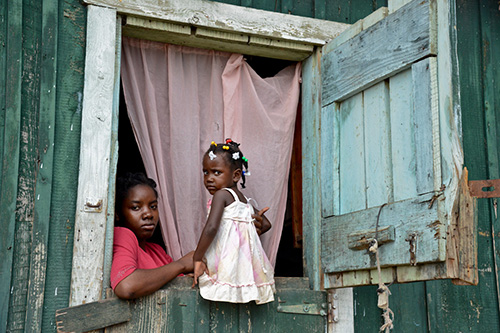
Photo credit: Daniel Cima for IACHR
Right to Equality and Non-Discrimination
These problems are only faced by Dominicans whose parents or grandparents are from Haiti. It is a result of structural racism in the Dominican Republic. All Dominicans of Haitian descent, or those perceived as such, are suffering from a situation of structural discrimination, in all regards and at all levels, which deprives it of the enjoyment and exercise of its human rights.
The Commission has not received complaints or information on Dominicans of foreign descent, who were not of Haitian descent, who had faced barriers in recognition of their nationality, in access to the civil registry, as well as their identity documents.
This discrimination has been fostered by the activities of certain authorities, political parties, and business and social actors within the Dominican Republic.
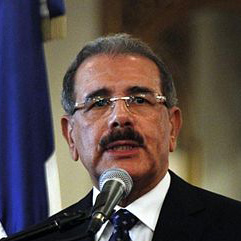
"There were young people who were pursuing their studies, walking 18 kilometers every day; when they were about to receive their high school diploma, it turned out that they had no identification document and therefore could not get their degree. I said I was sorry –I didn’t apologize- for everything they experienced in all this time and that I was going to launch a process of consultations to ascertain what we could do in coordination with the organs that have some authority vis-à-vis the measures that have been taken."
President Danilo Medina, at the meeting at the National Palacewith Dominicans of Haitian descent and society organizations in October 2013.
Photo credit: Amy S. Martin
Right to Education Without Any Discrimination
Although Dominican law recognizes that the right to education must be guaranteed without any discrimination, including those based on distinctions by nationality, race, economic and social position or of any other nature, the Commission received many testimonies of serious acts of discrimination in education.
The judgment 168/13 and the existing discriminatory situation have prevented children and adolescents of Haitian descent born in the Dominican Republic, from continuing their studies at school or in college. Teachers and school authorities require them birth certificate or an identification card, which the authorities refuse to hand.
Out of the 3,342 people who provided information and testimonies during the visit, 620 situations where these people or their relatives had faced obstacles in regard to the right to education were recorded.
Situation of Vulnerability
Arbitrary deprivation of Dominican nationality and legal status generates multiple violations to human rights.
One of the problems they face is the lack of job options. The testimonies indicate that it is virtually impossible to get work, and when they do, they pay less than the minimum wage.
Consequences of Denationalization
1- That children can not continue their basic education;
2- Can not enroll in higher education;
3- Unable to pay contributions to the Social Security System;
4- Unable to access certain health services;
5- No access to decent work;
6- Unable to get married or divorced;
7- Unable to register the birth of a child;
8- Unable to open a bank account;
9- Unable to obtain travel documents such as passports and therefore not able to travel internationally;
10- Unable to perform contracts;
11- Unable to buy or transfer property;
12- Unable to perform an affidavit;
13- Unable to vote and run for public office;
Bateyes
Workers in sugar cane plantations are still facing restrictions on their freedom of movement and residence, being forced to live in bateyes closed and guarded by armed guards.
In some cases cane cutters continue to be paid with vouchers and not with money.
In addition to the situations described above, this situation has led to a constant uncertainty that has had an impact on the physical and psychological integrity of the individuals concerned. To which must be added the constant fear of these people to be arrested and expelled from their country by not having identity papers.
In this regard, the Commission is of the view that the magnitude and protracted nature of this problem and of the repeated, ongoing violations of multiple human rights of the Dominicans of Haitian descent point to the existence of an inconventional state of affairs.
Photo credit: Amy S. Martin
"I was born in a hospital in Mao in Dominican Republic in 1999. My mom and dad are Haitians. At school they are already asking me for birth certificate, but they don’t give it to me... I feel bad because in the street they call me damn, dirty and treat me badly. We are all equal and that's not right. I have as much right to be Dominican as the others. I just want to study. This is not fair".
Testimony of a 15 year old woman born in the Dominican Republic, before the IACHR.Batey Libertad, Dominican Republic, December 4, 2013.
Intolerance and Incitement to Violence
The publication of Constitutional Court judgment 168/13 created a climate of hostility towards those who were critical of the judgment and who have defended the right of Dominicans of Haitian descent to Dominican nationality.
The expressions used against journalists, intellectuals, human rights defenders, and public figures critical of the judgment have taken an alarmingly aggressive tone, thereby fueling racism and xenophobia.
Critics of the Judgment Have Been Called “Traitors to the Homeland,” and Public Demonstrations Have Been Staged Under the Slogan “Death to the Traitors.”
These alleged threats and acts of intimidation elicited no response from the Dominican authorities.
Intolerance and racist discourse makes persons of Haitian descent all the more vulnerable to discrimination and violence.

Photo credit: Amy S. Martin
The "Committee for the Defense of the Nationality" developed an album to identify those who have criticized the judgment: first page / second page.
Source: Diario 7 Días
The report also covers violations of human rights of Haitian migrants in relation to immigration operations and due process; access to justice and guarantees of due process for Dominicans of Haitian descent.
Read chapter 5 of the Report
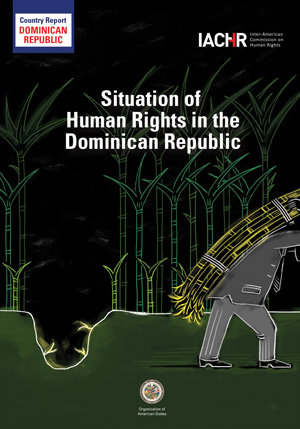
![The US flag flying over Fort Ozama. USMC, 1922, Santo Domingo, Dominican Republic By Richard from USA [CC BY 2.0 (http://creativecommons.org/licenses/by/2.0)], via Wikimedia Commons](http://www.oas.org/es/cidh/multimedia/2016/RepublicaDominicana/img/USMC,_1922,_Santo_Domingo,_Dominican_Republic_19_of_26_(6227519510)-p.jpg)

